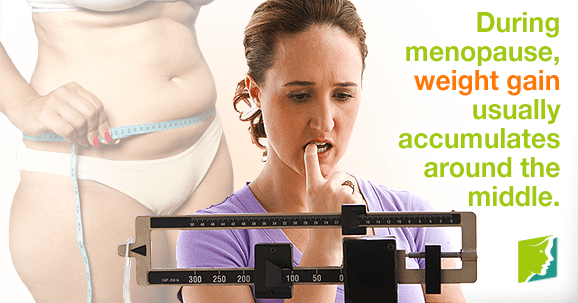Most menopausal women know how it feels to put off stepping on the scale for fear of confirmation of what you already suspect: that you've put on weight. Weight gain is a dreaded side effect of aging, and the average woman gains 12 - 15 pounds as she transitions through menopause. While menopausal weight gain may be common, it may be difficult to deal with for some women.
Menopause and Weight Gain
Weight gain is closely tied to the aging process in both men and women. As a person grows older, metabolism naturally slows down and muscle tissues become thinner, which makes it more difficult for the body to burn calories.
On top of this, the menopausal hormonal changes a women experiences typically between the ages of 40 - 55 can also cause or exacerbate weight gain. A decline in estrogen levels causes the body fat percentage to increase, and affects the way the body distributes that fat, resulting in weight gain that usually accumulates around the middle. While women of a child-bearing age tend to carry weight around their hips (i.e., “pear-shaped”) menopausal women tend to carry it around their waist and stomach (i.e., “apple-shaped”).
Other symptoms derived from hormone changes in menopausal women can also contribute to weight gain. Fatigue and mood swings may influence a woman's dietary choices and attitude toward exercise, potentially leading to weight gain. Hypothyroidism (i.e., an underactive thyroid) is another common condition in menopausal women, of which weight gain is a key symptom.
Why Is it Important to Manage Menopausal Weight Gain?
Weight gain in menopausal women usually accumulates around the middle. In terms of health risks, it's important to manage this extra weight because body fat stored within the abdominal wall and around the internal organs (i.e., visceral fat) increases the risk of cardiovascular disease and diabetes.
Weight management is also important for a woman's well-being. Extra body fat is likely to affect not only her energy levels and physical fitness. Menopause brings with it a number of physical and emotional changes in the body. It's important for menopausal women to feel good during this significant transition.
How to Combat Weight Gain
While crash diets and other extreme forms of dieting may seem like quick-fix options, these are unhealthy and slow the body's metabolism. The reality is that a low-fat, high-fiber diet with plenty of whole grains, fresh fruit, and vegetables, and exercising five days a week for 30 minutes is the most effective path for consistent, healthy weight management.
Though it's inevitable that gaining a few pounds around your belly might be upsetting, try not to get hung up on numbers, sizes, and what the scale says. Focus primarily on your well-being. Look at weight gain as an opportunity to embrace a healthier lifestyle with plenty of exercise, with improving your health as your main goal.
Sources
- Better Health Channel. (2013). Menopause and weight gain. Retrieved April 9, 2014, from http://www.betterhealth.vic.gov.au/bhcv2/bhcarticles.nsf/pages/Menopause_and_weight_gain
- Davis, S.R. et al. (2012). Understanding weight gain at menopause. Climacteric, 15(5), 419-429. doi:10.3109/13697137.2012.707385
- National Health Service UK. (2014). Menopause. Retrieved April 9, 2014, from http://www.nhs.uk/conditions/menopause/Pages/Introduction.aspx
- National Institute on Aging. (2014). Signs of the Menopausal Transition. Retrieved April 9, 2014, from http://www.nia.nih.gov/health/publication/menopause-time-change/signs-menopausal-transition
- National Institutes of Health. (2012). Obesity: MedlinePlus Medical Encyclopedia. Retrieved April 9, 2014, from http://www.nlm.nih.gov/medlineplus/ency/article/007297.htm




